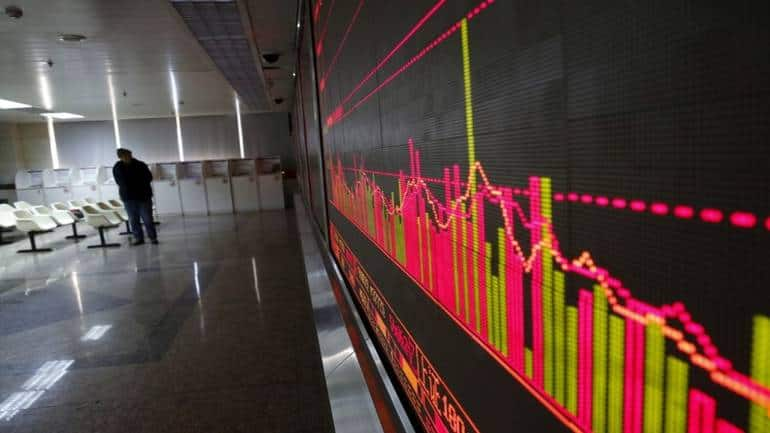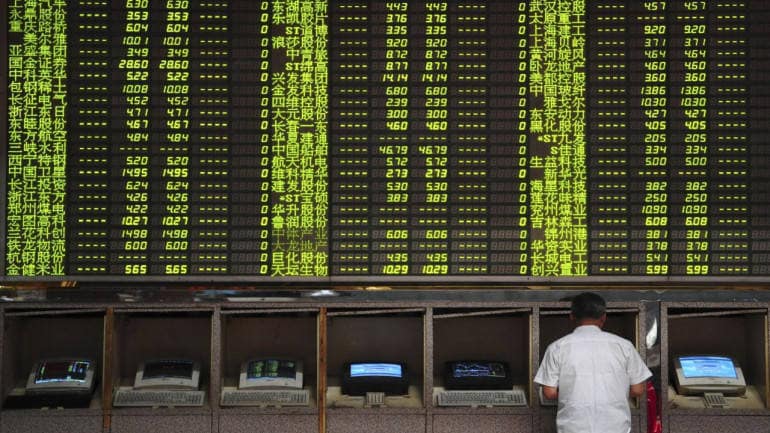Moneycontrol Pro Panorama | HDFC Bank’s Q1 slip has the market holding its breath
 ]
]
(Image: Reuters)
Dear Reader,
Usually, it’s always a toss-up on what’s keeping markets up or down. But today, the answer is staring you in the face.
At 12.45 pm, the Sensex is down by 1 percent, with HDFC Bank leading the pack of losers with a decline of 3.1 percent while its holding company HDFC is down by 2 percent.
HDFC Bank reported its results over the weekend and it appears investors are unimpressed, maybe even a tad concerned, by what they see. The bank has had a reputation for delivering consistent returns, with earnings growing by 18-20 percent over a year ago every quarter. But this quarter, it slipped to 16 percent growth, mainly due to provisions against loans turning bad.
Our research team pointed out that while its earnings growth was low relative to the usual trend, its core operating performance was strong. And, this quarter’s performance may have stumped the market, but the pandemic and the hit to its credit cards business by the RBI’s regulatory action do not affect its long-term prospects. Do read to know more.
But the bank’s results got investors in bank stocks worried today. While the market will be watching to see if other banks face similar pressures like HDFC Bank, the banking sector has another worry to tackle. The RBI has upped the ante against global payment companies who are not complying with its data storage norms. Its most recent action was a ban on fresh issuance of cards issued on the Mastercard network, for not complying with the local storage norms. This is a new headwind for banks. What’s the way forward, what do the local storage norms say and why are payment companies resisting? Here’s our take on the issue.
Asia is giving Indian markets company, as various indices such as the Hang Seng and the Nikkei 225 are flashing red. While there seems no new reasons, the spread of COVID-19 cases in Asia, inflation fears and fears on whether global growth could develop cracks are some possible reasons. In today’s FT selection, Morgan Stanley’s Ruchir Sharma writes about how cracks in the two global economic engines of growth—US and China—could pose a risk to global growth (free to read for Pro subscribers).
Investing insights from our research team
Reliance Retail Ventures: Dials Just Dial to strengthen its online initiative
Craftsman Automation: Decent Q1 FY22, a play on economic recovery
Monsoon Watch 2021 | Rainfall improves, but deficit hits sowing
Supreme Court flags the misuse of the sedition law
Can the electricity Bill switch on power supply reforms?
Chart of the Day: Coffee prices are on the boil
Massive passive: 50 years of the index fund (Republished from the FT)
Technical picks: Reliance, Bajaj Finance, Lupin and Apollo Hospitals (These are published every trading day before markets open and can be read on the app)
Thank you for subscribing to Moneycontrol Pro. We would love to hear from you. Check out our offers page here for exclusive discounts on select brands and giveaways.
For any feedback on the product and suggestions please click here. We promise to read your responses although we might not be able to reply to each one individually.
Ravi Ananthanarayanan
Moneycontrol Pro
Asia opens higher, but China tech worries weigh on Hong Kong
 ]
]
Most Asian share markets opened a fraction higher on Tuesday, ahead of a key decision by Australia’s central bank on its quantitative easing programme and despite ongoing concerns over the future regulation of China’s powerful technology sector.
U.S. markets were closed on Monday to mark the Independence Day holiday, leaving the Asian region without a strong lead to start trading on Tuesday.
MSCI’s broadest index of Asia-Pacific shares outside Japan was up 0.05%.
In Hong Kong, the Hang Seng Index was down 0.7% while China’s CSI300 was off by nearly 0.3%.
Japan’s Nikkei was up 0.45% while the S&P ASX200 stood 0.21% higher. In South Korea, the Kospi 200 Index rose 0.5% in early trade.
Chinese technology stocks remain under the microscope on Tuesday after the Cyberspace Administration of China (CAC) ordered an investigation into Didi Global Holdings just days after it listed on the New York Stock Exchange.
“There is still lingering uncertainty from China’s tech companies and they are prominent in the Asian market, so that could be a cloud for market sentiment,” said Tai Hui, JPMorgan Assset Management chief Asia market strategist.
“The tech sector is very significant in Asia and we are not going to have a lot of clarity on the regulatory adjustments in China for the next few weeks or even months and (that) will be an important driver for the market.”
Investor appetite for Chinese tech companies could be tested by Xiaomi Corp mandating 12 banks on Tuesday to lead a potential U.S. dollar debt issuance.
In Australia, the prospect of more mergers and acquisitions activity is being scrutinised by investors after a $16.7 billion bid for Sydney Airport Holdings Ltd from a pension fund consortium emerged on Monday.
“Sentiment appears to have almost moved past the (economic) reopening trade and into outlook for corporate earnings that are coming up in August,” Karen Jorritsma, head of equities at RBC Capital Markets in Sydney told Reuters.
“Generally (earnings) ‘confession season’ has been remarkably good, and with balance sheets in such great shape the tide is turning to potential for M&A.”
Globally, the publication of the U.S. Federal Reserve’s Federal Open Markets Committee minutes for June on Wednesday is highly anticipated by investors for guidance on whether ongoing emergency stimulus measures could start to be tapered.
Major European markets were in positive territory overnight despite a jump in the Brent crude price to above $77 a barrel, the highest level since October 2018.
The spike came after OPEC+ ministers called of discussions on Monday after clashing last week when the United Arab Emirates rejected a proposed eight-month extension to output curbs, meaning no deal to boost production has been agreed.
There has been no date set for the next meeting of ministers of OPEC+ countries - the Organization of the Petroleum Exporting Countries (OPEC) and allied producers including Russia - but sources told Reuters new discussions could begin in the next few days.
Elevated oil prices are adding to concerns that a higher global inflation rate could derail the post-coronavirus pandemic recovery under way in some major world economies.
The Reserve Bank of Australia is expected to keep the official cash rate target on hold at 0.1%, but has flagged it will announce its decisions on the broader quantitative easing programme which is set to end in September.
Economists predict the RBA will limit its three-year bond yield target of 0.1% to the April-2024 bond, rather than extending it to the November-2024 bond.
Top 10 things to know before the market opens
 ]
]
The Indian stock market is expected to open muted as trends on SGX Nifty indicate a flat opening for the index in India with a 10 points gain.
The Sensex closed 392 points higher at 52,699, while the Nifty50 gained 103 points to end at 15,790.
According to pivot charts, the key support levels for the Nifty are placed at 15,721.67, followed by 15,652.83. If the index moves up, the key resistance levels to watch out for are 15,840.37 and 15,890.23.
Stay tuned to Moneycontrol to find out what happens in the currency and equity markets today. We have collated a list of important headlines across news platforms which could impact Indian as well as international markets:
US Markets
The Nasdaq and the S&P 500 indexes hit all-time highs on Thursday, with the Dow also jumping, as U.S. President Joe Biden embraced a bipartisan Senate infrastructure deal.
The Dow Jones Industrial Average was up 1.04% at 34,225.35 points, while the S&P 500 gained 0.66% to 4,269.79. The Nasdaq Composite added 0.72% to 14,374.56.
Asian Markets
Asian markets were mostly higher tracking US markets overnight. Nikkei and Hang Seng rose 0.5 percent each, while Kospi and Taiwan index gained 0.7% each.
SGX Nifty
Trends on SGX Nifty indicate a flat start for the broader index in India, with a gain of 10 points. The Nifty futures were trading around 15,847 level on the Singaporean Exchange around 07:20 hours IST.
Reliance AGM 2021 | Here are the key announcements made by Chairman Mukesh Ambani
Reliance Industries (RIL) held its 44th annual general meeting (AGM) on June 24. The company’s chairman Mukesh Ambani, while addressing the shareholders, made a number of announcements across its telecom, retail and O2C business segments.
Google and JIO teams have jointly developed a breakthrough smartphone called JIOPHONE Next. The fully-featured smartphone supports the entire suite of applications from both Google and JIO, as well as the Android Play Store through which users will have access to the entire universe of Android Apps, Ambani said.
The Renewable Energy Project Management and Construction Division will provide gigawatt scale end-to-end solutions for large renewable plants across the world. “It will enable and partner with thousands of Green MSME Entrepreneurs, who can deploy kilowatt to megawatt scale solutions in agriculture, industry, residences and transportation. It will provide finance solutions to the stakeholders in our ecosystem,” Mukesh Ambani said.
RIL further announced the launch of new energy business in 2021 with the aim of bridging the green energy divide in India and globally.
India urges OPEC to phase out production cuts; bats for reasonable crude prices
Petroleum minister Dharmendra Pradhan has urged the Organization of the Petroleum Exporting Countries (OPEC) and allies – collectively known as OPEC+ – to phase out production cuts and also emphasised that crude prices should remain within a reasonable band.
“I took the opportunity to express India’s deep concern on increasing crude oil prices and its impact on consumers as well as on smart economic recovery. I emphasised that high crude prices is adding significant inflationary pressure on India,” Pradhan tweeted after the interaction. He added that the rise in crude prices and resulting fuel retail price in India is affecting smart economic recovery in the country.
RBI issues guidelines for NBFCs to declare dividend
The Reserve Bank of India (RBI) on June 24 issued guidelines that spell out the eligibility criteria for non-banking finance companies (NBFCs) to declare dividends. The RBI said the new rules are framed in order to infuse greater transparency and uniformity in practice.
The new guidelines will be effective for declaration of dividend from the profits of the financial year ending March 31, 2022 and onwards, the RBI said. According to the new rules to become eligible to declare dividend, an NBFC need to meet the applicable regulatory capital requirement for each of the last three financial years including the financial year for which the dividend is proposed.
Gold holds steady as traders seek direction from U.S. data
Gold prices held steady on Friday as investors awaited U.S. inflation data due later in the day after mixed signals from Federal Reserve officials this week on interest rate hikes.
Dollar firm as traders brace for U.S. inflation data
The U.S. dollar held near multi-month highs on Friday as investors warily awaited U.S. inflation data, while the pound nursed modest losses after Bank of England (BoE) policymakers leaned away from flagging rate rises.
Near-term global bond market correction likely
A significant global bond market correction is likely in the next three months as central bankers eye the exit door from pandemic emergency policy, according to a Reuters poll of strategists who also forecast modestly higher yields in a year.
Sebi plans to come out with framework for SPACs
Capital market regulator Sebi is planning to come out with framework on special purpose acquisition companies (SPACs), which will enable listing of startups on domestic stock exchanges, sources said on June 24.
The regulator is expected to put in place guidelines in this regard next week, they added.
With inputs from Reuters & other agencies